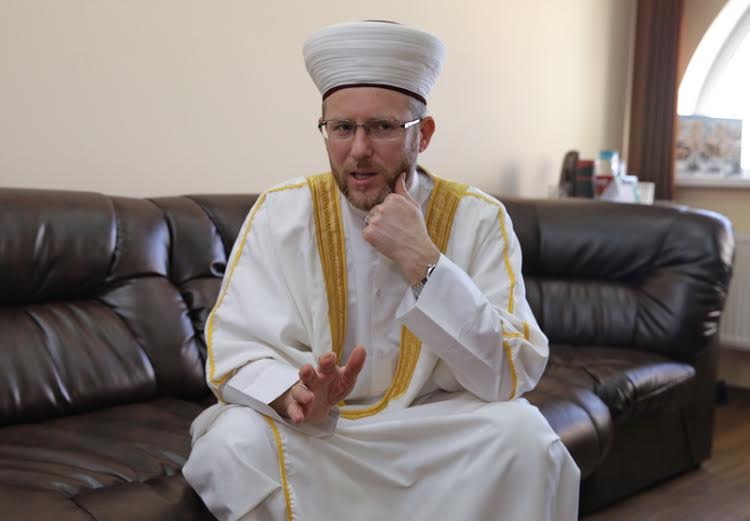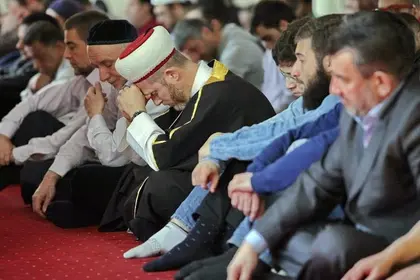Ukraine has
around 1 million Muslims, most living in Russia-occupied Crimea and
separatist-controlled areas of Donbas. Russia’s annexation of Crimea and the
hostilities in eastern Ukraine have kept some 750,000 of them, including a half-million
Crimean Tatars, trapped in the occupied territories and unable to maintain ties
with others who share their faith in Ukraine.
“Because of the Russian occupation we’ve lost contact with
co-religionists in these territories. We’ve lost
control over places of worship (there). Mosques,
madrasahs, libraries – everything that provides
for a full religious life for the community,” Said Ismagilov, the mufti of Ummah, the
center of spiritual administration of Muslims in Ukraine, told the Kyiv Post at
his office in the Islamic Cultural Center in Kyiv. “We cannot even protect
people there.”
- See the most contemporary Ukraine news reports for today.
- See the most contemporary Ukraine news reports for today.
- Ukraine War Casualties
JOIN US ON TELEGRAM
Follow our coverage of the war on the @Kyivpost_official.
Crimean
Tatars pressured at home
Crimean
Tatars were among the most vocal protesters against Russia’s annexation of the
peninsula in March of 2014, and have suffered for it since.
More
than 20 Crimean Tatars have gone missing since the Russian invasion of Crimea,
according to Mustafa Dzhemilev, a Ukrainian lawmaker and a prominent Crimea
Tatar leader. People face intimidation, harassment – such being forbidden to
hold a memorial service on Deportation Day on May 18, the day when in 1944 the
Tatars were deported en masse from Crimea to Central Asia on the orders of
Soviet leader Joseph Stalin. Those who do not recognize Crimea as part of
Russia are kidnapped, tortured and killed, Dzhemilev told Radio Liberty on Dec.
24.
“In Russia there is no freedom of speech and
thought – every religious community, including Muslims, is controlled by the
state and serves Kremlin’s policy. In Ukraine, Crimean Tatars had freedom. They
were not told which books to read. They were in charge of choosing their own
religious leaders. Everything was democratic,” Ismagilov says.
Dzhemilev
and Refat Chubarov, the head of the Crimean Tatar national assembly, the
Mejlis,
called on Tatars to boycott the sham referendum Russia organized to legitimize
Crimea’s accession to Russia on March 16, 2014. The occupying authorities then
banned both Dzhemilev and Chubarov from the peninsula after the Kremlin
formally took control of the Ukrainian territory.
Chubarov
says he was told by the new Crimean prosecutor Natalia Poklonskaya that he had
been banned from entering Crimea because he advocates policies that “demonstrate
an unfavorable attitude towards Russia” and because the Mejlis was “improperly
organizing holidays in Crimea.”
Moreover,
the new Crimean authorities threatened to declare the Mejlis a terrorist
organization. On Feb. 4, the European Parliament adopted a resolution
condemning the unprecedented level of
human rights abuses perpetrated against Crimean Tatars and restrictions of the Tatar
community’s liberties in Crimea since Russia’s annexation.
At the same
time, Muslims on Ukrainian territory enjoy all freedoms, as Islamic cultural centers
are being opened around Ukraine. The newest one opened its doors in
Dnipropetrovsk last month.
Numerous
religious leaders from Islamic countries have also repeatedly condemned Russian
repression of Crimean Tatars, but to little avail. “Russia has the following
position: you can condemn us if you want, but we’ll do whatever we want,” Mufti
Ismagilov says. “Crimea remains completely cut off. All we can do is to inform
the public about violations there.”
Muslims
in occupied Donbas lead quiet life
Compared
to Crimea, the lives of the nearly 250,000 Muslims residing in occupied areas
of Luhansk and Donetsk oblasts are easier – at least Muslims there are not
persecuted, the mufti says. The pseudo-republics still recognize Muslim
religious communities that were registered under Ukrainian rule. “Separatists
leaders imitate the situation in Russia, where Christian, Jewish, Buddhist and
Muslim communities are officially recognized,” Ismagilov says. “In Donbas they
formally recognize the Russian Orthodox Church and tolerate Muslims.” Muslims
living on Ukrainian territory still have possibility to help their relatives
and friends financially. They send money to the occupied territories to buy
food there, which is handed out to the needy in mosques.
Still,
there is no trace of the active worship that used to be practiced by Muslims
before the war, and the fate of two Muslim spiritual administrations located in
the occupied territories remains unclear, Ismagilov notes. Most Islamic educational
institutions on the occupied territories are not operating, because they did
not receive permission from the separatists’ authorities to resume their
educational programs. Muslims have often been intimidated into recognizing the
separatist authorities as well. “In the middle of 2014 we saw armed men
visiting the mosques and demanding that the Muslim communities officially
recognize the so-called Donetsk People’s Republic,” the mufti says. As a
result, most Muslims went underground and don’t participate in public life.
When
separatist movements started in Donbas in 2014 many Muslims, including imams,
the heads of mosques, and local Muslim communities for Sunni Muslims, took part
in pro-Ukrainian rallies in the cities of Luhansk and Donetsk oblasts. After
separatists took over the territory, most imams were forced to leave. As a result, Muslims in
Donbas occupied territories are left without the heads of their religious
communities.
Ismagilov,
a native of Donetsk, was one of those who fled his native hometown in 2014. In
the spring of 2014 he regularly took part in pro-Ukrainian rallies, which was
not safe then as “titushki (hired thugs) and Russians from (Russia’s) Rostov
shot activists with guns and threw Molotov cocktails at us,” he recalls. Later,
when the situation escalated in summer, Muslims and Christians gathered
together for common prayers for peace in Ukraine. “Our praying marathons were
regularly attacked. Priests were kidnapped and tortured,” Ismagilov recalls.
“One day Christian priests warned me that I would be next, and I fled to Kyiv
in September 2014. A few days later the separatists came to my house in
Donetsk, but no one was there.” He hasn’t returned to Donetsk since. And for
his patriotic, pro-Ukraine position, the Russia-backed armed groups in control
of Donetsk now consider Ismagilov an enemy.
Mufti breaks stereotypes

Said Ismagilov, the mufti of Ummah, the
center of spiritual administration of Muslims in Ukraine, ruines stereotypes of a closed and conservative
Muslim spiritual leader.
Ismagilov
seems to have little time for rest, working around the clock in Islamic
Cultural Center in Kyiv, as many Muslim refugees from the occupied that come to
Kyiv are in need of both moral and financial support. He is also watching events in war zone closely.
Nearly
100 Muslims are fighting in the Ukrainian army in the Donbas against
separatists, he says. For them, Ismagilov provided Islamic chaplains in 2014, selecting
“four elderly men who are physiologically resistant to war time horrors,” he
says.
Muslims at
the Islamic Cultural Center help Ukrainian army soldiers by donating food and
money to those at the front, and by donating blood to the wounded.
Ismagilov,
37, smashes the stereotype of a closed and conservative Muslim spiritual
leader. Having studied philosophy and religion in Donetsk and theological
studies at the Islamic Institute in Moscow, he is broadminded and erudite,
speaking Tatar, Arabic and English on top of Russian and Ukrainian.
The mufti
was among first Ukrainian public figures to condemn the terrorist attack in
Paris on Jan. 7, 2015 against journalists of the French satirical magazine
Charlie Hebdo, expressing his condolences to the families of the victims.
Ismagilov
is also a supporter of the idea that Muslims should integrate in the society
they live in, and he criticizes Muslims who come to Europe to live in closed
communities. Such behavior limits social ambitions, and as a result some young
people are easy targets for various terrorist groups, who lure them by
promising money and better social prospects, Ismagilov says. They could have
had that if they had been well integrated in the societies of their host
countries, the mufti says.
Given
the growing Islamophobia
in Europe, Ukraine, where Muslims and Christians have been living side by side
since 9th century, might serve as a good example of mutual religious
tolerance, Ismagilov believes. “Ukrainians don’t treat as enemies those who
respect their culture and traditions,” he says, adding that Muslims are fully
integrated in Ukrainian society and consider Ukraine their motherland. Ummah
publishes its religious press in Ukrainian, encouraging Muslims to learn and
master Ukrainian. “I call us Muslim Ukrainians,” the mufti adds.
Ismagilov
is active on social networks, with nearly 5,000 friends and nearly 10,000
followers on Facebook. But he is frequently bulled by aggressive Kremlin
trolls, many of whom are Russian Muslims. Everyday Ismagilov receives offensive
messages in which he is called a Banderivets – a supporter of the Ukrainian
post-World War II nationalist leader Stepan Bandera – for his pro-Ukraine
views.
He is a frequent
target for pro-Kremlin media too. In a story entitled “The Double Games of the Spiritual Administration of
Muslims of Ukraine” published on Nov. 27, 2014 by Russian online news site Krym
Segodnya (Crimea Today), Ismagilov was called a “russophobe” and “the mufti of
Maidan” alluding to his support for EuroMaidan Revolution in 2014.
Ismagilov,
who sometimes appears on public in a vyshyvanka – a Ukrainian traditional
embroidered shirt – has also earned the nickname of “the vyshyvatny mufti” from
Kremlin supporters. Ismagilov smiles and takes it as a compliment. “Wearing a
vyshyvanka shows you belong to Ukrainian society,” he adds.
Ismagilov
bought his first vyshyvanka in Yevpatoriya in Crimea in the summer of 2014.
“Among the stalls full of T-shirts with Putin, Medvedev and (Russian military
officer running separatists in eastern Ukraine Igor) Girkin, I happened to see
a tiny stand with Ukrainian vyshyvankas. It was so exotic and astonishing to
see them that I just had to buy one,” he says. Now he has four of them. Two
vyshyvankas are hanging in his wardrobe in the office – just in case. Ismagilov
is also fond of Ukrainian cuisine, saying varenyky with cherries and borshch
are his favorite Ukrainian dishes.
“A new national identity (in Ukraine) is developing now. A Ukrainian is a
person who loves and respects Ukraine, its language, culture, history and
traditions, regardless of one’s ethnic origin and religion,” Ismagilov says.
You can also highlight the text and press Ctrl + Enter




